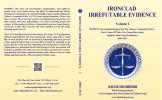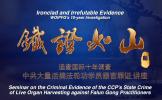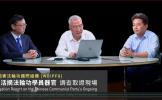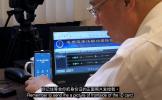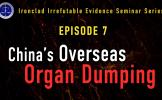WOIPFG’s Investigative Report on the Alleged Organ Harvesting of Living Falun Gong Practitioners at the Fifth Medical Center of the PLA General Hospital (Formerly the PLA No. 307 Hospital) and Its Staff Members Suspected of Participation
Address: 8 East Street, Fengtai District, Beijing
Phone:010-66947017
Foreword
The No. 307 Hospital of PLA is a tertiary level-A general institution that embodies medical treatment, teaching, and scientific research with a total of 1,500 beds.[1] The No. 307 Hospital is one of the first hospitals to be qualified for kidney transplantation, and among the early ones that carried out large-scale kidney transplantation in the army. In 2007, the WOIPFG published the recording of an investigative phone conversation with Chen Qiang, the contact person for kidney source at the transplantation department of the No. 307 Hospital. Chen revealed that dealings in Falun Gong practitioners’ organs involved a chain operation among authorities, police, and prison. He also stated that documents confirming organ donors as Falun Gong practitioners can be provided. Following the publication of the recording, the introduction of transplantation center was removed from the hospital profile, and it is now known as the Urology Department. Not only has the No. 307 Hospital never stopped conducting kidney transplant operations, but also the kidney transplant center is the hospital’s superior department.
I. Hospital Overview
What was later known as the No. 307 Hospital of the People's Liberation Army was founded in 1957 and had been named the Isotope Hospital of the National Ministry of Health. It was transferred to the military in 1958 and became an affiliated hospital to the Academy of Military Medical Sciences. In September 2005, the hospital moved from Beijing’s Haidian District to Fengtai District. The area of the new hospital site and building area were both three times larger than the original, and the number of beds increased as well. [2]
II. Kidney Transplant Center
According to a report of the official website of the hospital on August 10, 2014, Urology is one of the key departments of the hospital. The department has 80 beds. At that time, there were 23 clinicians, 2 director-level physicians, 5 deputy director-level physicians, 6 attending physicians, and 10 other physicians, including 1 tutor for Master’s degree students and 1 tutor for Ph.D candidates. [3]
According to a report of the official website of the Hospital on March 25, 2016, the kidney transplant center of the PLA No. 307 Hospital is able to carry out multiple types of kidney transplant surgeries, such as allogeneic kidney transplantation, relative’s kidney transplantation, autologous kidney transplantation, kidney transplantation for elderly patients, and pediatric kidney transplantation. [4]
1. Its kidney transplant center was established in 2000
Its kidney transplant center was established in 2000, and the hospital has completed nearly a thousand cases of allogeneic kidney transplantation and on multiple occasions provided kidney transplant guidance to hospitals outside Beijing.[5] The No. 307 Hospital of PLA is one of the military hospitals that performs kidney transplants early on a large scale.[6]
2. Doctor from 307 Hospital: Now kidney transplant surgery is being performed every night at the No. 307 Hospital.
According to a report on Minghui.org on May 10, 2006, a doctor from the No. 307 Hospital stated that now kidney transplant surgery is being performed every night at the No. 307 Hospital.[7] They don't know where so many kidney sources come from, and they don't understand why doctors must choose to do kidney transplants at night. After the operations, they transfer all the kidney transplant patients to other small hospitals nearby for post-op care. [8]
III. Telephone investigation: Chen Qiang, contact person for kidney sources, acknowledged that dealings in Falun Gong practitioners’ organs involved a chain operation among authorities, police, and prison.
Subject of Investigation: Chen Qiang, a kidney broker for the People’s Liberation Army No. 307 Hospital in Fengtai District, Beijing
Date: April 10, 2007 (Phone number: 86-10-13371621279)
(Recording 1: MP3; Transcript Download: pdf15)
Summary:
On April 10, 2007, 3:09 am to 3:28 am, a WOIPFG investigator spoke by phone with Chen Qiang, a contact person for kidney sources at the transplant department of the No. 307 Hospital of PLA. Chen stressed that dealings in Falun Gong practitioners’ organs involved a chain operation among authorities, police, and prison, and documents confirming organ donors as Falun Gong practitioners can be provided too. Those who did not reveal their names would be given a code. [9]
Subject of Investigation: Chen Qiang, contact person for kidney sources at the No. 307 Hospital of PLA
Date of Investigation: April 10, 2007
Transcript of Investigation:
Investigator: “Hello, Chen?”
Chen Qiang: Hello.
Investigator: Is that Chen?
Chen Qiang: Yes, it’s me. Go ahead.
Investigator: Hello. Last time I talked to you about kidney source. How is it going?”
Chen Qiang: Oh, didn’t you say contacting the prison for it, or that…?”
Investigator: Yes, or that from Falun Gong practitioners. That is correct.
Chen Qiang: I’ve heard that it’s more difficult now, you know.
Investigator: Where did you get them before?”
Chen Qiang: Eh, it was from Xicheng.
Investigator: Xicheng...so you are now in... there’s another thing, how do you verify that it is from a Falun Gong practitioner? Did you find out about this?”
Chen Qiang: How to verify that it is from a Falun Gong practitioner? Well, when the time comes, someone from authorities here will give you documents, you know. He will give you documents. You can rest assured. We have access to high-ranking officials, we have access to people from above, you know? I’ll give you these documents even if you had not mentioned it, you know?
Investigator: Alright, but there is another thing that I am not completely clear about and don’t quite understand. That is, these people are detained in forced labor camps or prisons. I know, usually it’s in the local police station...
Chen Qiang: Nowadays very few are held in forced labor camps.
Investigator: Ok, but where are they usually detained now?
Chen Qiang: Now they are all held in prisons...all in prisons now. Usually, they are sent away from Beijing and transferred to prisons in other cities/provinces.”
Investigator: I heard from others that, several years ago, they arrested many Falun Gong practitioners who did not give their names after they were detained, quite a few; they detained them underground, the kind of place that was neither a prison nor a labor camp…
Chen Qiang: You are talking about what was going on around 2003. I know exactly what you are talking about. They started to not reveal their names in 2003. You know what is happening to Falun Gong now, we have to pull them out from 2003 files, you know?
Investigator: Oh, so there were many in 2003?
Chen Qiang: Yes. There were lots of Falun Gong practitioners on file from around 2003.
Investigator: You see, the 50,000 yuan in advance is no problem, just as I told you. I can give you 20,000 yuan extra to just make you feel secure. But about the total amount that’ll have to be paid later, let me know a number, so that I feel more certain when I follow through.
Chen Qiang: About this...you’d say...eh...I have to use contacts to find it for you. The money they ask for specifically..., eh... it will be around 200,000 yuan. Do you understand?
Investigator: Right.
Chen Qiang: About Falun Gong...I later called them...I asked my boss to call them, who said they’d have to pull them out from there.
Investigator: Oh.
Chen Qiang: Now (the Falun Gong practitioners) have all been transferred to prisons in other cities/provinces. They (i.e. the officials) need to transfer (the organs) from there...so the money..a large portion of this money must be paid to the people over there, you know that?
Investigator: Yes. You know that, several years ago, they secretly detained many Falun Gong practitioners, who had gone to petition but did not provide their names. There were no records, no registrations.
Chen Qiang: Yes, it is quite normal, you know … so they don’t have their names—I am telling you—they only have code numbers, you understand?
Investigator: Yes.
Chen Qiang: If they could not find out their real names, they could just assign code numbers, you know.
Investigator: Oh.
Chen Qiang: And it’s done according to their fingerprints...the person’s fingerprints...it’s done according to that, you know? It’s all done this way now...in today’s society, who’d have no...who’d have no...he’d have no way to have it done...especially things like this, you know it?
Investigator: Right.
Chen Qiang: I’m telling you that when such things are done—it’s not that I don’t want to tell you things – I can’t tell you specifically what kind of people are involved and their names, you understand that?
Investigator: Right.
Chen Qiang: Such as people from above...the contacts in local police, I can’t tell you about them. I can’t handle this casually. How can I do it so casually? We are all well connected. Since I am doing this, so I have connections each step of the way. How can it be done without connections?
Investigator: That’s right, I just...
Chen Qiang: With such things, it’s all a chain operation, you know it?
Investigator: Right.
IV. Witness testimony
Falun Gong practitioner Yu Ming went to three organ transplant hospitals in Beijing in November 2018.Shown in the video he took at the risk of his life were: the General Hospital of the Armed Police, the No. 309 Hospital of the People's Liberation Army, and the No. 307 Hospital of the People's Liberation Army.
Yu Ming said that in the No. 307 Hospital of the People's Liberation Army in Beijing, doctors obviously have been trained in specific ways to deal with people who come to investigate organ transplants. “We can see that many things are strictly confidential here. When we asked about the organ transplant price and waiting time, he [a hospital representative] immediately became alert.” [10]
V. The main responsible persons
JFJZ-DW307001 Chen Lijun, male.
Personal Profile: Chen is the Director of the Department of Urology and director-level doctor of the No. 307 Hospital of the PLA. He is also the youth member of the PLA Organ Transplant Committee.
He graduated from the Medical Department of Shanghai Second Military Medical University in July 1987, and obtained a doctor of medicine degree from the General Hospital the PLA in 1998.
From 1998 to 2000, he was engaged in post-doctoral research at Kansas University Medical Center in the United States.
After returning to China in 2000, he established the Kidney Transplant Center in the 307 Hospital of the PLA to carry out allogeneic kidney transplantation, living donor kidney transplantation between relatives, and autologous kidney transplantation due to renal artery stenosis, totaling more than 200 cases. [11]
JFJZ-DW307002 Qu Nan, male.
Personal Profile: Qu is the attending physician of the Department of Urology, the No. 307 Hospital of the PLA.
He graduated from the Department of Medicine of the First Military Medical University in July 1994. He participated in more than 200 cases of allogeneic kidney transplantation, living donor kidney transplantation between relatives, and autologous kidney transplantation due to renal artery stenosis in 307 Hospital. [12]
JFJZ-DW307003 Mai Haixing,
male, born in December 1981. [13]
Personal Profile: Mai is the attending physician of the Department of Urology, the PLA No. 307 Hospital
He graduated from the Department of Clinical Medicine of the Fourth Military Medical University in 2005, and obtained a Master of Medicine degree from the Fourth Military Medical University in 2008.
His work includes immune tolerance after kidney transplantation, the diagnosis and treatment of acute and chronic rejection after kidney transplantation and the treatment of various postoperative complications in patients. [14]
JFJZ-DW307004 Zhao Li, male.
Personal Profile: Zhao is the deputy director-level doctor of the Department of Urology, the PLA No. 307 Hospital.
He is engaged in organ transplant surgery and post-transplant anti-rejection therapy. [15]
References
[1] The PLA No. 307 Hospital. Baidu Encyclopedia. Retrieved from http://www.307hospital.com/yyjjnew.jhtml
WOIPFG Archived Link:
http://www.upholdjustice.org/upload/images/nationalcriminalreports/748…
[2] Introduction of The PLA No. 307
[3] Official Website of China’s center for minimally invasive urology at the No. 307 Hospital of the People’s Liberation Army of China
http://www.80213077.cn/sai/11375.htm
[4] Kidney transplant Center at the No. 307 Hospital in Beijing
http://www.mfghj.com/sai/11375.html
Link to WOIPFG archives:
http://www.zhuichaguoji.org/cn/images/nationalcriminalreports/750.png
Kidney Transplant Center, The PLA No. 307 Retrieved from http://www.mfghj.com/sai/11375.html
Link to WOIPFG Archives:
http://www.upholdjustice.org/upload/images/nationalcriminalreports/750…
[5]The PLA No. 307. Baidu Encyclopedia. Retrieved from http://www.baike.com/wiki/307%E5%8C%BB%E9%99%A2
Link to WOIPFG archives:
http://www.upholdjustice.org/upload/images/nationalcriminalreports/749…
[6] Kidney Transplant Center, the PLA No. 307. Retrieved from http://www.mfghj.com/sai/11375.html
WOIPFG Archived Link:
http://www.upholdjustice.org/upload/images/nationalcriminalreports/750…
[7]Investigation by Minghui.org dated May 10, 2006: the 307 Hospital in Beijing performs kidney transplant surgery every night http://www.minghui.org/mh/articles/2006/5/10/127363p.html#2006-5-9-chcl…
[8]Common Efforts to Investigate Organ Harvesting of Living Donors—Stop Persecution (I) by Minghui.org on June 22, 2006
http://www.minghui.org/mh/articles/2006/6/22/130561.html
[9]WOIPFG Collection of Evidence of Live Organ Harvesting from Living Falun Gong Practitioners by the Chinese Communist Party
http://www.zhuichaguoji.org/node/46728#_Toc366574827
[10]The Epoch Times: Detailed Narrative of Yu Ming’s Videos of a Transplant Hospital—the General Hospital of the Armed Police by Yu Qingxin
https://www.epochtimes.com/gb/19/7/10/n11376889.htm
[11]Chen Lijun from the No. 307 Hospital of the People’s Liberation Army of China
http://www.80213077.cn/yygk/myzj/1144.html
https://web.archive.org/web/20140629031431/http://www.80213077.cn/yygk/…
[12]Attending physician Qu Nan from the No. 307 Hospital of the People’s Liberation Army of China
http://www.80213077.cn/yygk/myzj/1322.html
https://web.archive.org/web/20140417025523/http://www.80213077.cn/yygk/…
[13]Profile of Mai Haixing, a doctor from The Fifth Medical Center of PLA General Hospital
http://www.302hospital.com/z.php?id=4403
[14] Attending physician Mai Haixing from the No. 307 Hospital of the People’s Liberation Army of China
http://www.80213077.cn/yygk/myzj/1318.html
https://web.archive.org/web/20140629032759/http://www.80213077.cn/yygk/…
[15]Basic Information on Zhao Li on xywy.com
http://z.xywy.com/zhuanjia-307yy-miniaowaike-ftzhaoli.htm
https://web.archive.org/web/20140417025519/http://z.xywy.com/zhuanjia-3…


